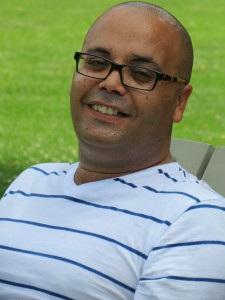On Sunday, January 21, 2018, one of our veteran Arabic teachers, Dr. Anwar Ben Badis, was featured in an article in the Times of Israel news site. Below is the text, here is a link to the original article (and here is a link to a .pdf version). Looking to learn Arabic yourself? Our classes are full this year, but watch our website (https://jicc.org.il/heb/center-for-arabic-instruction/) for further details for next year!
Al-salam alaikum! Is it finally time for Israelis to learn Arabic?
Teachers and language schools are noticing a rise in the number of locals learning Arabic, although attitudes and angles depend on who’s teaching, and where
In the 20 years linguist Anwar Ben-Badis (emphasis ours) has been teaching Arabic, he’s heard nearly every reason why Jewish Israelis choose to learn his native language.
There are right-wingers and settlers; one settler eventually left the West Bank and moved into Israel proper.
Even President Reuven Rivlin studied with Ben-Badis, as did Knesset member Benny Begin.
His students are generally Jerusalemites who, as residents of a simultaneously mixed and divided city, brush up against their Arab neighbors at the supermarket, the mall and the movie theater and want to be able to say “excuse me” in Arabic (aläafw), or “I only speak a little Arabic” (anaa ataHaddath faqaT qaliil min aläarabiyya).
Perhaps they also want to know what the imam is calling from the minaret at 4 a.m.
His students, some 300 this year, study three hours a week — plus homework — hoping to achieve a comfortable level of spoken Arabic.
Actually, learning a little Arabic is something of a trend right now, particularly among adults who have time to spare and believe that when your neighbor speaks a different language, it’s important to know what they’re saying.“It’s important to me to help them understand that it’s very acceptable to learn Arabic, even though it’s the language of the enemy,” said Ben-Badis. “I’m trying to help free the Israeli student from thinking of it as the enemy’s language, but rather as a way to connect with me. It’s not obvious to them.”
The Jerusalem municipality offers continuing education language classes each year in Arabic and Hebrew, as well as Spanish, Italian and Yiddish. There isn’t generally a huge demand for Italian, said Hagit van der Hoven, who heads the continuing education department, but the Arabic classes are always full.
This year, the municipality opened Arabic classes to its staff as well. “We figured that was the right thing to do,” said van der Hoven. “In Jerusalem, we have joint lives, and we just need it.”
In Tel Aviv, Ishmael Ben Israel, the linguist co-founder of A.M.A.L. — Spoken Arabic for All, a nonprofit that places Palestinian university students in elementary schools in and around Tel Aviv to act as ambassadors of Arabic culture — is also the CEO of LingoLearn, a for-profit, online language learning site. He has hundreds, maybe thousands of students currently studying Arabic, said Ben Israel, whose “hippie” parents named him for the eldest son of the biblical Abraham, a prophet and patriarch in Islam.
Ariel Olmert, the son of former prime minister Ehud Olmert, founded Ha-ambatia, or The Bathtub, a private language school with branches in Tel Aviv and Haifa. Having added Arabic classes to its French offerings four years ago, the school now has 400 students learning Arabic. It creates its own educational materials and aims to make language acquisition a living, breathing endeavor.
In the 20 years linguist Anwar Ben-Badis has been teaching Arabic, he’s heard nearly every reason why Jewish Israelis choose to learn his native language.
Congratulations Anwar!
Many thanks to the Jerusalem Foundation for its ongoing support of our Arabic-language classes.


